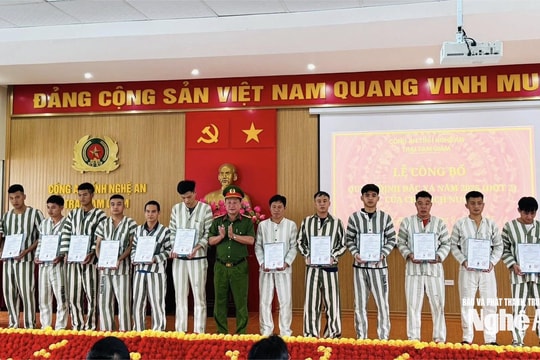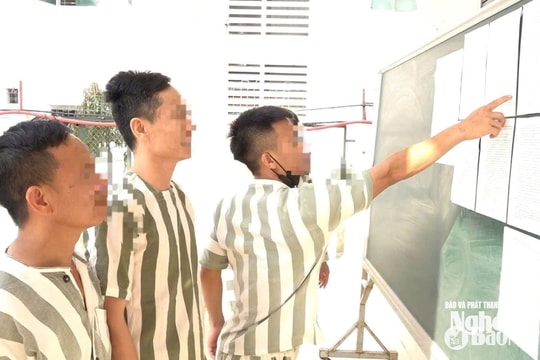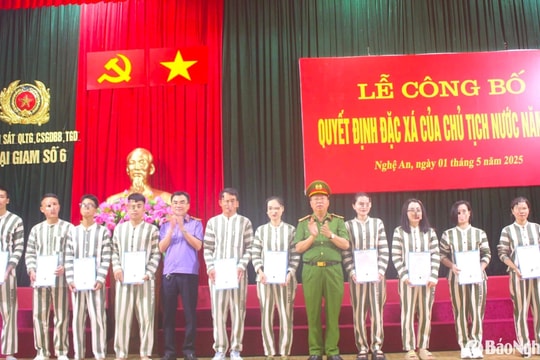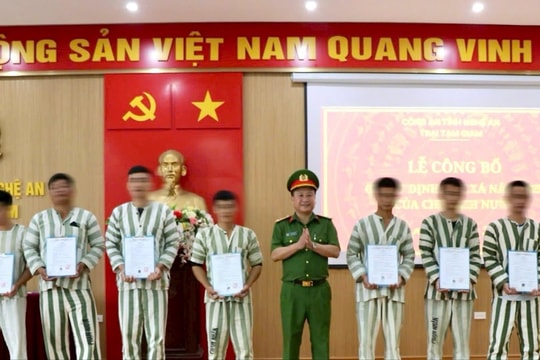16 types of prisoners not eligible for amnesty in 2016
The 2016 amnesty does not apply to people convicted of very serious acts of violating national security, committing terrorism, or organizing resistance against law enforcement officers.
On the occasion of National Day, the President granted amnesty and early release to those sentenced to life imprisonment or fixed-term imprisonment, up to November 30.
Accordingly, a person sentenced to a fixed term of imprisonment or life imprisonment that has been reduced to a fixed term of imprisonment may be proposed for amnesty when all of the following conditions are met:
- Serve at least half of the prison sentence with a fixed term of imprisonment. If the prison term has been previously reduced, the reduced term will not be counted towards the time served in prison.
- Serving a prison sentence of at least 15 years with a life sentence, if after being reduced to a fixed-term prison sentence, the prison term is further reduced, the subsequent reduced term will not be counted towards the time served in prison;
- Comply with regulations of prisons, temporary detention camps, and temporary detention houses; continuously be classified as having good or better reform performance.
- Completion of additional penalties of fines, compensation for damages, arrears, court fees or other civil obligations, except for prisoners not sentenced to imprisonment for corruption crimes who are 70 years of age or older, or 60 years of age or older but are often sick, or who are suffering from a serious illness that they and their families are no longer able to pay for.
Persons sentenced to fixed-term imprisonment who have served at least 1/3 of the time and persons sentenced to life imprisonment which has been reduced to fixed-term imprisonment and have served at least 13 years, may be proposed for amnesty when falling into one of the following cases:
- Great achievements during the time of serving a prison sentence, with confirmation from the prison, detention camp, or criminal enforcement agency of the district-level police;
- Being a war invalid; sick soldier; a person with achievements in fighting to protect the Fatherland and building socialism who has been awarded one of the following titles: Hero of the People's Armed Forces, Hero of Labor, People's Teacher, People's Physician, People's Artist, the titles of Brave Soldier in the resistance war against the US to save the country; a person who has been awarded one of the types of Resistance Medals or Medals; a person whose relatives are martyrs; a child of a Vietnamese Heroic Mother; a child of a family with meritorious services to the country;
- When committing the crime, the person is a minor;
- Be 70 years of age or older;
- Is a person with a serious illness or is 60 years of age or older and is often sick and cannot take care of himself/herself, with a medical examination conclusion or written confirmation from a competent health authority;
- Having especially difficult family circumstances and being the only breadwinner in the family, with confirmation from the People's Committee of the commune where that person resides;
- Female prisoners who are pregnant or have children under 36 months old living with their mothers in prisons, temporary detention camps, or temporary detention centers.
16 cases not recommended for amnesty
- The court's judgment or decision against that person is being appealed under the supervisory or retrial procedure;
- Being prosecuted for other crimes;
- Previously pardoned;
- Having two or more criminal records;
- Committing very serious or especially serious crimes that violate national security.
- Being sentenced to imprisonment for one of the following crimes: terrorism; sabotage of peace; crimes against humanity; war crimes; organized resistance to public officials or committing crimes multiple times or causing serious consequences or inciting, enticing or inciting others to commit crimes;
- Sentenced to imprisonment of 10 years or more for the crime of intentionally violating human life, health, dignity and honor;
- Sentenced to imprisonment of 7 years or more for robbery, snatching, kidnapping for the purpose of appropriating property, illegal production of narcotics, illegal trading of narcotics, and appropriation of narcotics.
- Committing organized murder; hooligan murder; intentionally causing injury in an organized or hooligan manner or committing the crime multiple times against one person or multiple times against many people; incestuous rape; incestuous child rape; robbery with the use of weapons; organized robbery, snatching, theft of property or causing serious, very serious, or especially serious consequences; robbery multiple times, snatching multiple times, theft of property multiple times (two or more times).
- Committing drug-related crimes and being sentenced to less than seven years in prison with the remaining term of imprisonment being over one year; in cases of committing drug-related crimes but not falling under the cases specified in Clause 9 of this Article, if sentenced to imprisonment from seven to fifteen years with the remaining term of imprisonment being over two years or being sentenced to imprisonment of over fifteen years or life imprisonment with the remaining term of imprisonment being over three years.
- The mastermind, leader, commander or person who uses cunning tricks, the stubborn opponent in an organized crime case.
- There is evidence to confirm illegal use of drugs.
- Currently serving a prison sentence for committing three or more crimes or committing two intentional crimes, including cases of combined sentences.
- Has a criminal record and was sentenced to prison for intentional crime.
- Having been sent to a compulsory education facility, including a previous education facility or a reformatory school and sentenced to imprisonment for one of the following crimes: drug-related; murder; child rape; robbery; snatching; extortion; fraud; theft; kidnapping for the purpose of appropriating property; resisting a person on official duty; trafficking in women or human beings; trafficking, exchanging or appropriating children; disturbing public order; consuming property obtained by another person through crime.
The Supreme People's Court directs and guides people's courts and military courts at all levels to coordinate with the procuracy and criminal enforcement agencies to prepare dossiers and lists of proposed pardons to submit to the President for decision.
Phan Xam/ VNE








